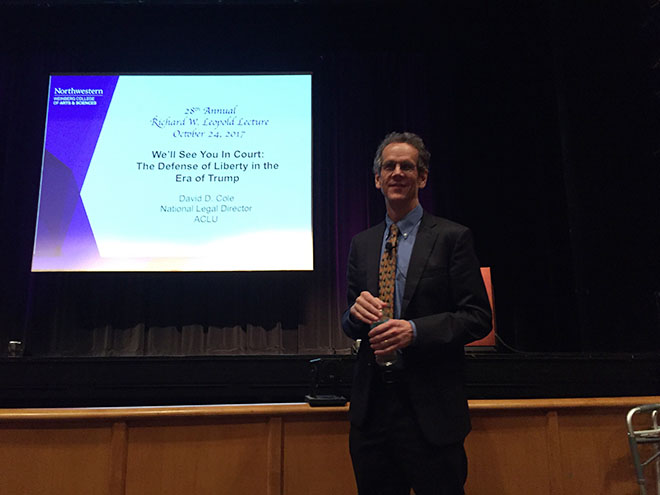
David D. Cole, legal director of the ACLU, speaks to a crowd at Cahn Auditorium.
Photo by Gabrielle Bienasz / North by Northwestern
“There were thousands of people outside, chanting, ‘ACLU, we stand with you!’” David D. Cole, legal director of the American Civil Liberties Union, said. “And, lo and behold, the courts served the first injunction against the travel ban, declaring it unconstitutional.”
David D. Cole spoke in Cahn Auditorium on Oct. 24 and detailed a surge in civil engagement in the wake of President Trump’s election that, according to Cole, is the reason the administration has not been able to achieve a number of policy goals.
Cole included the Muslim ban in that category, which he said was frustrated partially due to resistance by ordinary citizens.
“That was the day thousands of Americans got off their couches, turned off their TVs and went to airports ... to demonstrate for people who did not have a vote, for people who did not have a say,” Cole said.
The former George J. Mitchell Professor in Law and Public Policy at Georgetown argued that the reason for the upswing in political participation – the ACLU had 400,000 members before the election and has since swelled to 1.6 million members – is due to an identified “threat” to civil liberties.
For Cole, that “threat” is one person: President Trump. For an organization that issued a legal challenge to the January travel ban fewer than 24 hours after it was issued, so-called “resistance” is a reality of the situation.
“And we have indeed sued President Trump,” Cole said. “Again, and again, and again and again.”
Students said they were galvanized by his speech.“The ACLU is more important now than ever,” Weinberg senior Freddy Levenson said. “I think he articulated that really well.”
The speech was the 28th in a yearly lecture series to honor the memory of the late Richard Leopold, a former history professor at Northwestern.
“David Cole talks clearly the way Dick Leopold did in his classes; we are all delighted to be here to hear to him speak and remember Dick Leopold,” Sheppard Shanley, associate director of admissions and longtime Willard faculty member, said.
The ACLU legal director was unwavering in his defense the organization's various stances – the right not to be tortured by the CIA, the right to not be detained on secret evidence – however, the right to not be blocked from seeking an abortion on account of immigration status, became a relevant topic on Tuesday.
“In fact, just before coming to this lecture, we got notice that, absolutely, she has a right to seek the abortion,” Cole said, speaking of a recent case centered around the abortion rights of an undocumented teenager.
Cole maintained the organization’s stance as non-partisan throughout the lecture, defending civil liberties for all viewpoints, even those purported by hate groups.
“I think suppressing speakers like Richard Spencer gives him exactly what he wants. It spreads his message, it makes him a martyr; it gives him more power than he deserves,” Cole said. “If we let him speak and we ignore him because his views are worthy of being ignored, then no one would have heard of him.”
Further, the director argued that allowing the government to control any aspect of free speech was dangerous.
“If you believe there are disadvantaged groups that need to be heard, then the last thing you want to do is give the government the right to suppress speech. And that's why that's been the ACLU's position since the beginning.”
Regardless of ideology, students were excited by the prospect of continued political engagement.
“It made me pretty hopeful,” McCormick freshman Katherine Johns said. “Even though, like he said, this is a pretty dark time for civil liberties – this is when change can happen.”